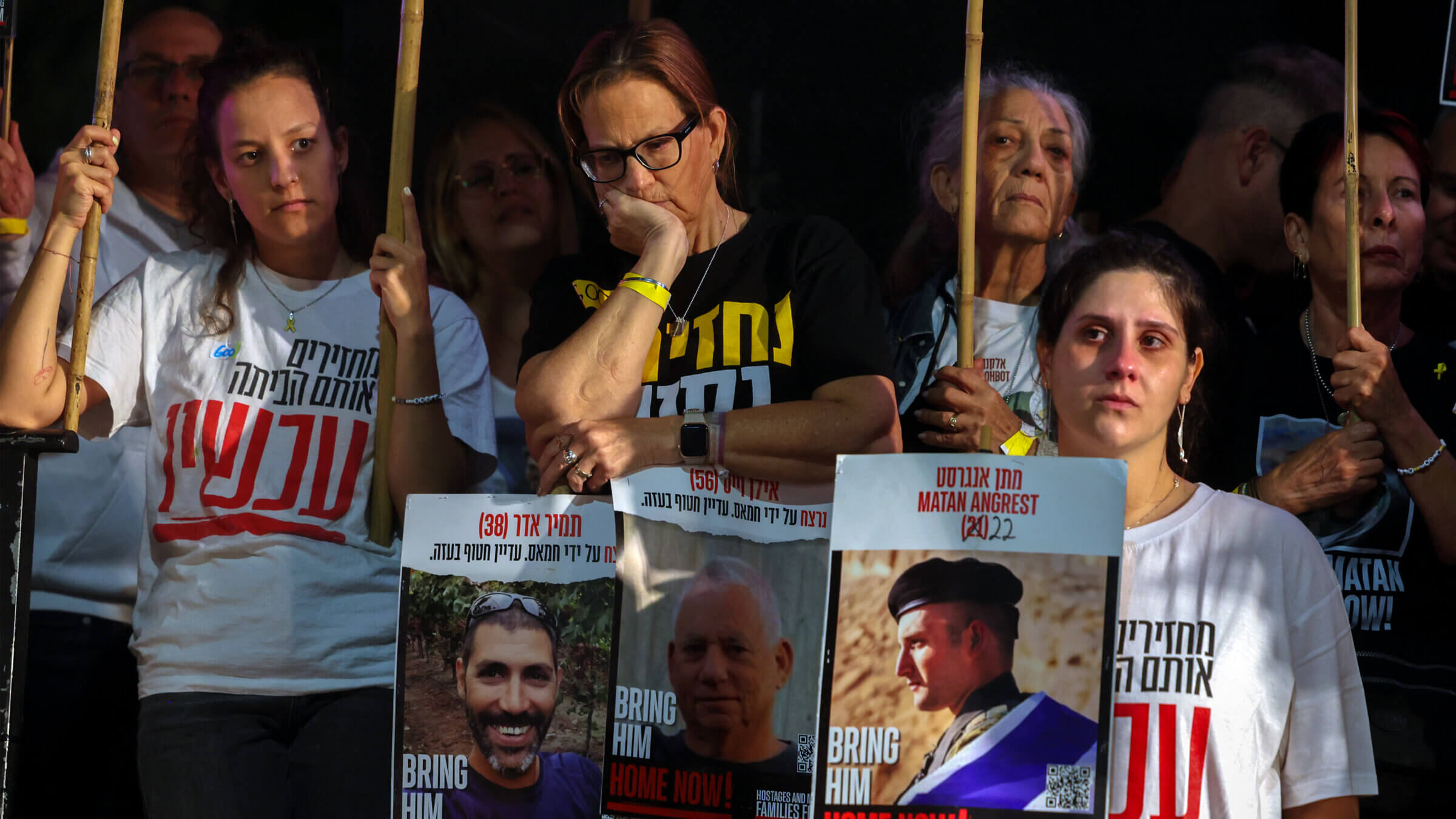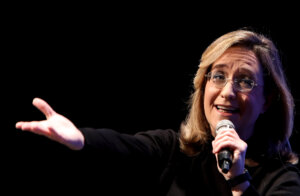After 600 days of war, is it time to retire the phrase ‘tikkun olam’?
As Israeli journalist Ilana Dayan observes, perhaps we can’t repair the world — but maybe we can give it a little more air

Relatives and supporters of Israeli hostages hold their portraits during a protest at Hostages Square in Tel Aviv on May 28, 2025, to mark 600 days of their captivity. Photo by Getty Images
Last night I watched an interesting exchange on Israeli television. On the sad occasion of 600 days of war, anchor Niv Raskin of Channel 12 interviewed Ilana Dayan, one of the most famous journalists in Israel and host of the highly regarded investigative television program Uvda, about the role of journalists in this ongoing crisis.
Journalists do not do tikkun olam, Dayan said — they do not “repair the world.”
What journalists do, in her view, is “ivrur olam” — bring fresh air to the world. This is a unique and interesting way of looking at things. In the early days of Israel, many people started the day by opening windows and airing out bed linens.
Americans might say that a story “sheds light” on an issue but not that it “sheds air.” Dayan’s comment made me think about how many diaspora Jews are very interested in, and perhaps obsessed with, the concept of tikkun olam, while many Israelis are now resigned to situations — or more precisely the matzav, “the situation,” in the singular.
Polls show that many Israelis have lost hope in peace. In March, The Jewish People Policy Institute found that “85% of Israel’s Jews believed there was no realistic prospect for a peace deal in the foreseeable future, with 70% expressing this sentiment ‘strongly.’”
As Raskin and Dayan discussed, many Israelis have lost faith in the government — and incredibly, there still hasn’t been a full accounting for the massive security failure of Oct. 7.
Prime Minister Benjamin Netanyahu, notably, has not taken responsibility for what happened.
It’s important to remember that prior to the unprecedented disaster, hundreds of thousands of Israelis were protesting in the streets against changes to the judiciary — which may have been exploited by Hamas as a moment of weakness and division in Israeli society, and an opportunity to attack.
But no matter what the causes of Oct. 7 were, the two prominent journalists agreed that airing the stories of what happened to individuals on that day and afterward won’t change anything about the current reality; at most, it would only add air.
Reconsidering the centrality of ‘tikkun olam’
Dayan’s belief that there is no tikkun olam in her often-heartbreaking journalism intrigued me, because the phrase is everywhere in Jewish communal discourse around the globe. It is perhaps as omnipresent as the 24-hour news cycle.
Something interesting about the discourse in the post-Oct. 7 Jewish world in America is whether tikkun olam has been emphasized above Jewish peoplehood, and above support of the state of Israel.
“We wanted you to be Zionists,” Rabbi Ammiel Hirsch, the senior rabbi of Stephen Wise Free Synagogue in New York City, said in a clip from a sermon that was widely shared, in which he agonized over members of the Reform Jewish movement who were demonstrating against Israel. “We did not intend that our emphasis on tikkun olam — social repair — would lead some Jews to join anti-Israel demonstrations. We did not intend for Jews to lead Passover Seders in so-called ‘liberated zones.’”
The papal roots of ‘tikkun olam’
The concept of tikkun olam does not appear in the Torah — and it really became popular after a visit from the pope to the U.S.
Scholars trace its probable first use to the 1st century C.E. in rabbinical commentaries in the Talmud.
“While the term may be traced back to Talmudic texts and the early post-Temple liturgy and it later played an important role in medieval Jewish mystical tradition, the meaning of tikkun olam has evolved over time,” Jonathan Krasner, the chair of Jewish education research at Brandeis University, wrote in what is considered an authoritative article on the subject.
“Although by the 11th and 12th centuries it was invoked thrice daily in the liturgy, tikkun olam remained a fairly obscure notion until it was appropriated by the Kabbalists,” Krasner wrote, adding that the phrase “was not widely adopted in North America until the 1970s and 1980s.”

In a database search, Krasner found no matches for the terms “tikkun olam,” “tikun olam,” “tikkun ha’olam,” and “tikkun ha-olam” before 1946. In fact, Krasner wrote, “they barely registered before 1970.”
Incredibly, the catalyst for the popularity of tikkun olam as a phrase and a concept — and its ubiquity today — were the remarks of a rabbi at a dicey moment in 1987 after the pope met with Austria’s then-president Kurt Waldheim, who had served as a Nazi intelligence officer, then later that year with Jewish leaders in Miami, hoping to repair relations between Jews and Catholics.
Rabbi Mordecai Waxman, then the chairman of the International Jewish Committee on Interreligious Consultations, mentioned the concept of tikkun olam as a reason for reconciliation.
“To mend the world means to do God’s work in the world,” Waxman told the pope. “Your presence here in the United States affords us the opportunity to reaffirm our commitment to the sacred imperative of tikkun olam, the mending of the world.”
Airing Israeli perspectives
I wonder if part of “ventilating the world,” for Ilana Dayan, has been airing perspectives that the rest of the global media doesn’t focus on. She has been doing a series of long and intense interviews with released hostages, such as one with Eli Sharabi which lasted several hours and astonished the entire country.
Raskin said he couldn’t get up from the couch after watching.
Later in the program, the conversation turned to the war and why it has taken so long.
Almog Boker, a young journalist, and the seasoned anchor Niv Raskin agreed that it has been obvious since the beginning that what has kept Hamas in power during 600 days of war is its control over aid. The world has been unable to separate Hamas from food distribution.
The view among these journalists is that what is keeping Gazans from full revolt against Hamas is that Hamas continues to control food distribution — a point of view that I don’t often see aired in American media.
It’s interesting that the tikkun olam focus is often on criticizing Israel, not supporting Gazans who want to oust Hamas.
Maybe talking about how Gazans must remain loyal to Hamas because they need the food whose distribution it controls is one way of adding air to the world, of ivrur olam. It won’t change the global conversation — but it will, perhaps, add some ventilation for those looking for it.
















